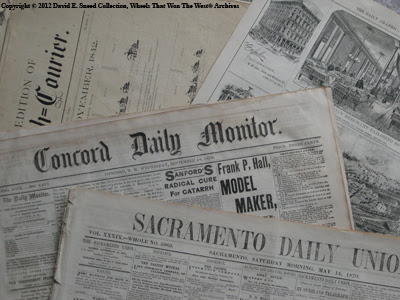Travel west of the Mississippi river in the mid-1800's could be full of challenges. Some of those trials were recorded in diaries, newspapers, and letters of the time period. Other travelers recounted memories in book form to be shared with future generations. All of these primary source accounts help us better understand the stresses faced by the vehicles, animals and individuals headed west into rugged and wild terrain.
"The night drives were among the most trying experiences upon the overland journey. Usually they resulted from the drying of some stream or spring where we had expected to make the evening camp, and the consequent necessity of moving forward. Our worst drive of this kind was to reach La Prelle River after leaving Fort Laramie
While trials could take their toll on man and beast, there were also many heroics recorded in newspapers of the time. Some read like an action-packed Hollywood script as did this account from the Shasta Courier in December of 1855...
"One day last week the driver of one of the California Stages was thrown from his box, a short distance this side of Cottonwood . The team at once commenced going at a frightful pace. The outside passengers jumped off, and the chances for a beautiful smash-up were quite flattering. This would doubtless have been the consequences, but for the conduct of Mr. Lusk, messenger of the Pacific Express, who, with a daring seldom equaled, climbed from the inside of the stage upon the driver's foot board, thence upon the tongue of the stage, and finally upon the back of the near wheel horse, from which position he gathered up the lines, and brought the frightened team, and still more frightened passengers, safely up to the Cottonwood station."
Both the early and modern film industry is sometimes accused of exaggerating or sensationalizing the 1800s western experience. Perhaps it's somewhat to be expected as time has a way of clouding reality and generating a certain amount of cynicism in larger-than-life tales. However, the fact that so many of these adrenaline-packed events can be found in early narratives reminds us that our ancestors did indeed possess mettle worthy of respect and woven with reward.
